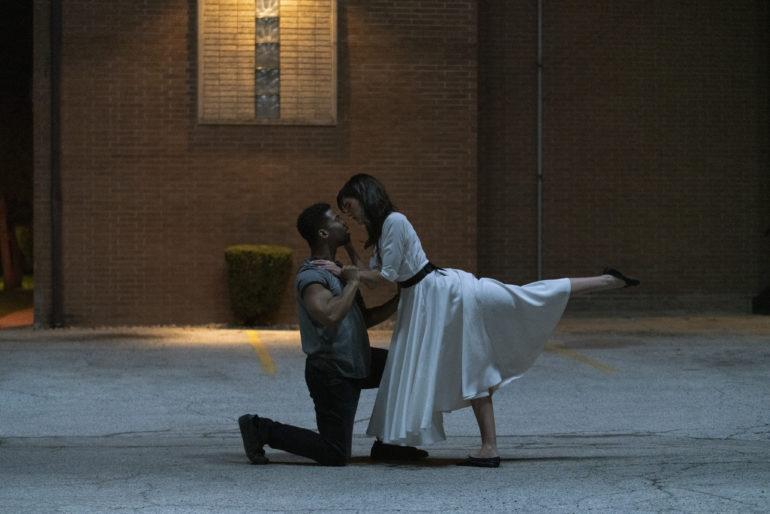‘Soundtrack’ on Netflix: TV Review
By Caroline Framke
LOS ANGELES (Variety.com) – Netflix’s new musical drama “Soundtrack,” from “Smash” executive producer Joshua Safran, is a deeply frustrating entry to the genre. Originally pitched as “Mixtape” for broadcast network TV, “” uses a vague framework of “Love songs are good” to have its characters lip-sync existing songs — by artists ranging from Demi Lovato to Joni Mitchell —at sporadic moments throughout the series. In two intertwining timelines, romantic leads Sam and Nellie — played with verve by Paul James (“Greek”) and Callie Hernandez (“Under the Silver Lake”)— circle each other and express their frustrations to the tune of Imagine Dragons and St. Vincent. Their concerned mother figures Antoinette (Marianne Jean-Baptiste) and Margot (Madeleine Stowe) pace across the screen to Whitney Houston and Dolly Parton. Nellie’s father, Frank (Campbell Scott), fittingly embraces classic dad rock, while Sam’s struggling cousin Dante (Jahmil French) prefers The Weeknd.
Though the series opens with Sam earnestly gushing to the camera about how “every song is a love song” and about the importance of finding music that speaks to your experience, the song selection tends to be either totally nonsensical or cloyingly literal. It’s often clear when a musical interlude happens just because the show wanted to see a performer tackle it, most notably whenever it features Jenna Dewan, a fantastic dancer who does her damnedest to nail the random numbers she gets. For every one number that works, there are five that feel more like the show is bragging about having a huge music rights budget rather than unveiling a necessary piece of catharsis. (The less said about the discordant attempts at mashups, featuring songs that have no business being anywhere near each other, the better.) It’s telling that a couple of the best numbers throughout this first season include one using multiple versions of Mitchell’s seminal track “Both Sides Now,” thus conveying the wisdom that comes with age and loss, and another that unfolds with characters getting lost inside a graphic novel. These, at least, have more of a narrative purpose and distinct style than the more typical “Hey, did you notice that these lyrics kinda describe this exact situation?” vibe.
Then there’s the awkward fact of the lip-syncing. As any drag performer knows, there are ways to lip-sync a song while doing justice to the core emotionality of it. Yet that lesson seems to have escaped most of the actors on “Soundtrack,” who largely depend on James Alsop’s (wonderful!) choreography rather than their own performances to carry the weight of the moment. Notable exceptions to the rule include Jean-Baptiste and Megan Ferguson, who plays Nellie’s best friend and gets a spotlight episode in which she channels some Big Brassy Broad Energy with throwback Broadway tunes. Otherwise, the hard cuts to lip-syncing are more jarring than enlightening. Too often, they either underline a feeling the story has already hammered home or, even more strangely, create a distance between the characters and viewer. Sometimes a song like Lovato’s “Sorry Not Sorry” will entirely replace a key confrontation scene that, quite frankly, would have been far more revealing and rewarding to experience through actual dialogue rather than a song shortcut.
For these reasons, it would be tempting to write “Soundtrack” off as a failed experiment. But it’s even more exasperating to watch these scenes flop because there’s plenty of good narrative material surrounding them. In the past timeline, there’s Nellie learning to own her own voice as she tackles her past and the thorny subject of cultural assimilation. In the present, there’s Sam fighting for his son, Dante adjusting to life out of prison, Antoinette learning how to balance tough love with support. Even when the show takes some overwrought turns, the nonmusical scenes, at least, sell the gravity of them with appropriate care. Then, suddenly, a song will swoop in to emphasize that gravity with such unconvincing fervor that whatever power the story had in the first place vanishes. Maybe “Soundtrack” wouldn’t get half the attention it might without all its big and sparkly musical numbers jazzing it up. But it’s easy to imagine a version that tried anyway, trusting the material to sell itself without depending on a swelling chorus to underline the point.

